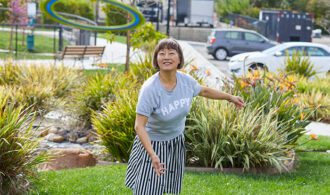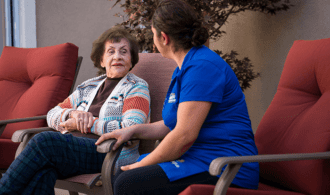Generations COVID-19 Vaccine Update: Keeping Your Loved Ones Safe
Social distancing and wearing masks have become daily precautionary measures for Americans as this global pandemic reaches far and wide. Keeping you and your loved ones safe has been Generations’ number one priority during these challenging times. Generations will be part of the first wave of COVID-19 vaccine phases in California, Colorado, Oregon, Utah, and Washington. While these timelines are fluid, healthcare workers and residents in long-term care facilities can assure that state governments see the risk COVID-19 poses for us all. They prioritize taking care of us so that we can take care of others.
“Our staff, healthcare heroes, and residents – the reason we are here – have all put in extraordinary effort, adapted to tremendous change, and made personal sacrifices to reach this moment. They are among the most asked during this pandemic, and they did it on faith that we would get to this moment. It is wildly appropriate that they are honored with such an early opportunity to receive the vaccine.” – Rebecca Stayner, Director of Compliance and Infrastructure.
The FDA works with states in conjunction with the CDC to ensure distribution plans for the COVID-19 vaccine. This includes opening storage facilities and vaccine distribution centers and ensuring those most vulnerable to COVID-19 are protected in hospital and long-term care facilities. This also includes frontline workers who put their life at risk daily to care for patients and residents.
We do not have an exact time frame for the vaccine’s rollout.
Our team is working with local and state governments to plan the distribution of the COVID-19 vaccine to our staff and residents. The CDC and FDA expect the vaccine to be two doses for maximum efficacy, with a rollout starting by the end of 2020. Our onsite clinics will ensure our residents and staff can quickly and easily get the COVID-19 vaccine as soon as available. This is at zero cost to everyone involved. Our residents, staff, and families will be the first to know as quickly as our onsite clinics are scheduled.
Generations will continue to adhere to CDC guidelines for COVID-19 prevention. From personal protection equipment, testing our staff and residents, and adhering to mask-wearing and social distancing, Generations will continue to be diligent with precautions and infection control measures to help keep residents, staff, and our communities safe.
We will continue to provide updates to the public, our staff, families, and our residents as we have them.
Generations are grateful to the CDC, FDA, and state and local governments for prioritizing our residents and employees during the COVID-19 pandemic. We look forward to distributing the vaccine and prioritizing everyone’s health and safety within the Generations family as we face daily life in the COVID era.
COVID-19 Vaccine Frequently Asked Questions
When will a COVID-19 vaccine be available?
The CDC believes the general public (those not in prioritized phases, such as healthcare workers, residents in healthcare settings, people with high risk, non-healthcare essential workers, congregate settings, and older adults) may begin the vaccination process in late Spring. The supply of the vaccine will increase in 2021. By the fall of 2021, most Americans should have received or received the COVID-19 vaccine.
What is a vaccine Emergency Use Authorization (EUA)?
During a public health emergency and as soon as it is proven safe and effective, the pharmacies have completed all needed steps. Results and data have been reviewed and approved by independent advisory committees. The FDA has the power to authorize the use of a vaccine. No actions are skipped during the safety evaluation or vaccine development. The FDA will not grant a EUA if the data shows it’s ineffective or unsafe.
Why do people need to get the COVID-19 vaccine?
COVID-19 is highly infectious and puts many around you at risk for long-term complications or death. Since you can carry COVID-19 asymptomatically, you could spread it without knowing you have it. By vaccinating as much of the population as possible, starting with those most likely to be affected, we can reduce the risk of those long-term complications and rising death rates and help reduce transmission rates across the country. The vaccine itself does not save lives; people getting vaccinated will.
Will the vaccine help end COVID-19?
The CDC believes community spread will lessen over time by using all the available tools available. The COVID-19 vaccine is one tool to prevent its spread. It will not eradicate it. Wearing masks, social distancing, and staying home as much as possible, along with the vaccine, are the best ways to prevent its spread until most of the population is vaccinated.
Do you need two doses of the COVID-19 vaccine?
Yes. The majority of COVID-19 vaccine trials across the globe require two shots. The first dose primes the body; the second dose ensures its effectiveness.
Can you pay to get the COVID-19 vaccine sooner?
No. The CDC, FDA, and state and local governments are working together to ensure the vaccine makes its way to health care workers, frontline workers, and the most vulnerable among us before the general population will be eligible to be vaccinated.
Will the vaccine help you avoid getting COVID-19?
Because of its proven effectiveness in clinical trials, experts believe that the COVID-19 vaccine will help you avoid getting COVID-19. It’s not foolproof. It may be possible, though unlikely, to still get COVID-19; experts believe in that case that your symptoms and risk of severe outcome are minor than going without the vaccine. The vaccination will also help reduce community spread to those at increased risk of severe illness. This is why mask-wearing and social distancing are crucial after getting the vaccine.
Will the COVID-19 vaccine give you COVID-19?
No. The COVID-19 vaccines being developed in the U.S. do not use any form of the virus. Each vaccine aims to teach our bodies how to recognize and fight the COVID-19 virus. Like many vaccines, sometimes this can cause symptoms as the body’s immune system builds immunity.

All Generations communities are different, with each location offering a combination of services.

Keeping you and your loved ones safe have been Generations’ number one priority during these…

